⚡ Introduction: Energy Is the New Currency (200–250 words)
Table of Contents
ToggleIn today’s fast-paced world, where creativity and innovation are paramount, the ability to maintain peak cognitive performance is essential for individuals striving to excel in their fields. Whether you are a creator, entrepreneur, or professional, optimizing your cognitive function can significantly enhance your productivity and creativity. In this comprehensive guide, we will explore The High-Energy Creator Daily Routine for Peak Cognitive Performance (Backed by Science), delving into scientifically-backed strategies that can help you unlock your full potential.
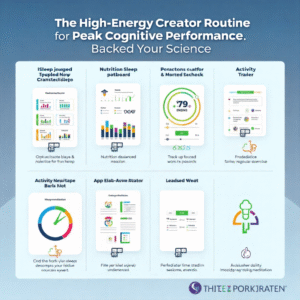
Understanding Cognitive Performance
Cognitive performance encompasses various mental processes, including attention, memory, problem-solving, and creativity. Each of these components plays a crucial role in how effectively we can generate ideas, analyze information, and execute tasks. Understanding how to optimize cognitive performance is vital for anyone looking to enhance their creative capabilities.
The Components of Cognitive Performance
- Attention: The ability to focus on relevant stimuli while filtering out distractions.
- Memory: The capacity to store, retain, and retrieve information.
- Problem-Solving: The ability to analyze situations and develop effective solutions.
- Creativity: The capacity to generate new ideas and think outside the box.
To cultivate a high-energy routine that fosters these cognitive skills, we must adopt a holistic approach that considers various aspects of our daily lives.
1. Prioritizing Sleep for Peak Cognitive Performance
The Science of Sleep
Sleep is often underestimated, yet it is one of the most critical factors influencing cognitive performance. During sleep, the brain undergoes essential processes that facilitate learning, memory consolidation, and emotional regulation. According to the National Sleep Foundation, adults typically require 7-9 hours of quality sleep each night to function optimally.
Research Findings: A study published in the journal Sleep found that sleep deprivation negatively impacts attention, working memory, and decision-making abilities. Individuals who do not get enough restorative sleep are more likely to experience cognitive decline and reduced creativity.
Strategies for Improving Sleep Quality
To optimize your cognitive performance, consider implementing the following sleep strategies:
- Establish a Consistent Sleep Schedule: Going to bed and waking up at the same time each day helps regulate your body’s internal clock, promoting better sleep quality.
- Create a Relaxing Bedtime Routine: Engage in calming activities such as reading, meditating, or practicing gentle yoga to signal to your body that it’s time to wind down.
- Limit Exposure to Screens Before Bed: Blue light emitted by screens can interfere with melatonin production, making it harder to fall asleep. Aim to reduce screen time at least an hour before bedtime.
- Optimize Your Sleep Environment: Ensure your bedroom is conducive to sleep by keeping it dark, quiet, and cool. Investing in blackout curtains and a comfortable mattress can significantly enhance your sleep quality.
2. Nourishing the Brain with Proper Nutrition
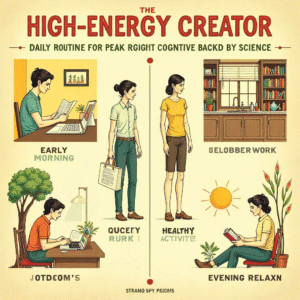
The Role of Nutrition in Cognitive Function
Nutrition plays a pivotal role in cognitive performance. The brain requires a variety of nutrients to function optimally, and a well-balanced diet can significantly enhance cognitive abilities. Key nutrients that support brain health include:
- Omega-3 Fatty Acids: Found in fatty fish, walnuts, and flaxseeds, omega-3s are essential for brain health and have been shown to improve memory and learning.
- Antioxidants: Foods rich in antioxidants, such as berries, dark chocolate, and leafy greens, help protect the brain from oxidative stress and inflammation.
- B Vitamins: B vitamins, particularly B6, B12, and folate, are crucial for energy production and neurotransmitter synthesis, both of which are vital for cognitive function.
Research Findings: A study published in Frontiers in Aging Neuroscience found that a diet high in fruits, vegetables, and healthy fats is associated with better cognitive function in older adults.
Tips for a Brain-Boosting Diet
To nourish your brain effectively, consider the following dietary strategies:
- Eat a Variety of Foods: Incorporate a colorful array of fruits and vegetables into your meals to ensure you receive a wide range of essential nutrients.
- Stay Hydrated: Dehydration can impair cognitive function, so aim to drink plenty of water throughout the day. The general recommendation is to consume at least 8-10 cups of water daily, adjusting based on activity levels and climate conditions.
- Limit Processed Foods: Reduce your intake of sugary and processed foods, as they can lead to fluctuations in energy levels and cognitive performance. Focus on whole, nutrient-dense foods that provide sustained energy.
3. Engaging in Regular Physical Activity
The Connection Between Exercise and Cognitive Performance
Regular physical activity is not only beneficial for physical health but also plays a crucial role in enhancing cognitive performance. Exercise increases blood flow to the brain, promotes the release of neurotrophic factors, and improves mood, all of which contribute to better cognitive function.
Research Findings: A review published in Psychological Bulletin found that regular aerobic exercise is associated with improvements in attention, working memory, and executive function. Engaging in physical activity has also been linked to neurogenesis, the growth of new brain cells, particularly in the hippocampus, an area associated with memory.
Tips for Incorporating Exercise into Your Routine
To reap the cognitive benefits of exercise, consider the following strategies:
- Aim for Consistency: Engage in at least 150 minutes of moderate-intensity aerobic exercise each week. This can include activities such as brisk walking, cycling, swimming, or dancing.
- Include Strength Training: Incorporating strength training exercises at least twice a week can enhance overall fitness and cognitive function. Resistance training has been shown to improve executive function and memory.
- Take Breaks to Move: If you have a sedentary job, take short breaks to stand up, stretch, or go for a quick walk. Movement breaks can boost circulation and mental clarity, helping you maintain focus throughout the day.
4. Cultivating Mindfulness and Mental Clarity
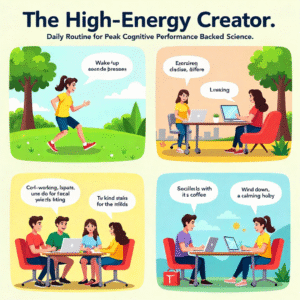
The Benefits of Mindfulness
Mindfulness practices, such as meditation and deep breathing, can significantly enhance cognitive performance by promoting mental clarity and reducing stress. Mindfulness encourages individuals to focus on the present moment, which can improve attention, creativity, and decision-making.
Research Findings: A study published in Psychological Science found that mindfulness meditation improved working memory and cognitive flexibility. Practicing mindfulness can also reduce anxiety and enhance emotional regulation, leading to better overall cognitive performance.
Tips for Practicing Mindfulness
To incorporate mindfulness into your daily routine, consider the following strategies:
- Start with Short Sessions: Begin with just a few minutes of mindfulness meditation each day. Gradually increase the duration as you become more comfortable with the practice.
- Focus on Your Breath: Use your breath as an anchor to bring your attention back to the present moment whenever your mind wanders. Deep breathing exercises can help calm the mind and enhance focus.
- Incorporate Mindfulness into Daily Activities: Practice mindfulness while eating, walking, or engaging in other daily tasks. Fully immerse yourself in the experience, paying attention to your senses and thoughts.
5. Structuring Your Workday for Maximum Productivity
The Importance of Time Management
Effective time management is crucial for optimizing cognitive performance. Structuring your workday to align with your natural energy levels can enhance focus and productivity. Understanding when you are most alert and focused allows you to tackle challenging tasks when your cognitive abilities are at their peak.
Research Findings: Studies have shown that working in focused bursts, known as the Pomodoro Technique, can improve concentration and reduce mental fatigue. This technique involves working for a set period (typically 25 minutes) followed by a short break (5 minutes), allowing for sustained focus and mental recovery.
Tips for Structuring Your Workday
To maximize your productivity, consider the following strategies:
- Identify Your Peak Hours: Pay attention to when you feel most alert and focused during the day. Schedule your most demanding tasks for those times to optimize your cognitive performance.
- Use Time Blocks: Divide your work into time blocks, such as 25 minutes of focused work followed by a 5-minute break. This approach helps maintain concentration and prevents burnout.
- Limit Multitasking: Focus on one task at a time to improve efficiency and reduce cognitive overload. Multitasking can lead to decreased productivity and increased errors.
6. Fostering Creative Thinking
The Role of Creativity in Cognitive Performance
Creativity is a vital component of cognitive performance, allowing individuals to generate innovative ideas and solutions. Engaging in creative activities can stimulate the brain and enhance cognitive flexibility, enabling you to approach problems from different angles.
Research Findings: A study published in the Creativity Research Journal found that individuals who engage in creative pursuits experience improved problem-solving skills and cognitive functioning. Creative thinking also fosters resilience and adaptability, essential traits in today’s rapidly changing world.
Tips for Fostering Creativity
To nurture your creative abilities, consider implementing the following strategies:
- Engage in Diverse Activities: Explore various creative outlets, such as painting, writing, or playing a musical instrument. Engaging in diverse activities stimulates different areas of the brain and fosters creative thinking.
- Collaborate with Others: Engage in group brainstorming sessions to gain new perspectives and ideas. Collaboration can lead to innovative solutions and enhanced creativity.
- Embrace Failure: Allow yourself to experiment and take risks in your creative endeavors. Viewing failure as a learning opportunity can lead to valuable insights and breakthroughs.
7. Building a Supportive Environment
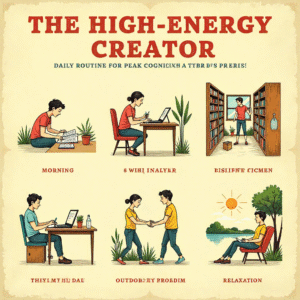
The Impact of Environment on Cognitive Performance
The environment in which you work can significantly affect cognitive performance. A cluttered or distracting workspace can hinder focus and creativity, while an organized and aesthetically pleasing environment can enhance productivity.
Research Findings: Studies have shown that a well-organized workspace can lead to improved concentration and productivity. Additionally, exposure to natural elements, such as plants or natural light, has been linked to enhanced mood and cognitive function.
Tips for Creating an Optimal Work Environment
To create a supportive work environment, consider the following strategies:
- Declutter Your Workspace: Remove unnecessary items from your desk to create a clean and organized environment. A tidy workspace can help reduce distractions and enhance focus.
- Incorporate Natural Elements: Adding plants or natural light to your workspace can improve mood and cognitive function. Studies have shown that exposure to nature can reduce stress and enhance creativity.
- Limit Distractions: Use noise-canceling headphones or find a quiet space to minimize distractions while working. Reducing noise and visual clutter can significantly improve concentration.
8. Implementing Technology Mindfully
The Double-Edged Sword of Technology
In the digital age, technology can be both a boon and a bane for cognitive performance. While it offers tools for productivity and creativity, it can also lead to distractions and cognitive overload.
Research Findings: A study published in Computers in Human Behavior found that excessive use of technology, particularly social media, can negatively impact attention span and cognitive performance.
Tips for Mindful Technology Use
To harness the benefits of technology while minimizing its drawbacks, consider the following strategies:
- Set Boundaries: Establish specific times for checking emails and social media to avoid constant distractions. Limiting technology use can help you maintain focus on important tasks.
- Use Productivity Apps: Consider using apps designed to enhance productivity, such as task managers or focus timers. These tools can help you stay organized and focused on your goals.
- Practice Digital Detox: Schedule regular breaks from technology to recharge your mind. Engaging in offline activities can enhance creativity and cognitive performance.
9. Embracing Lifelong Learning
The Importance of Continuous Learning
In a rapidly changing world, embracing lifelong learning is crucial for maintaining cognitive performance. Engaging in continuous learning fosters curiosity, adaptability, and creativity, all of which are essential for success.
Research Findings: A study published in The Journal of Applied Psychology found that individuals who engage in lifelong learning experience improved cognitive function and job satisfaction.
Tips for Fostering Lifelong Learning
To cultivate a mindset of continuous learning, consider the following strategies:
- Pursue New Skills: Take up new hobbies or enroll in courses that challenge you. Learning new skills stimulates the brain and enhances cognitive flexibility.
- Read Widely: Explore books, articles, and research across various fields to broaden your knowledge and perspective. Reading stimulates cognitive function and fosters creativity.
- Engage in Discussions: Participate in discussions or debates with peers to exchange ideas and challenge your thinking. Engaging with others can enhance critical thinking skills and creativity.
Conclusion
In conclusion, The High-Energy Creator: Daily Routine for Peak Cognitive Performance (Backed by Science) emphasizes the importance of a holistic approach to optimizing cognitive function. By prioritizing sleep, nourishing the brain with proper nutrition, engaging in regular physical activity, cultivating mindfulness, structuring your workday effectively, fostering creativity, and creating a supportive environment, individuals can unlock their full cognitive potential.
Implementing these scientifically-backed strategies can lead to improved focus, enhanced creativity, and increased productivity. As you embark on your journey to become a high-energy creator, remember that consistency and commitment are key. By adopting these practices, you can cultivate a daily routine that supports peak cognitive performance and empowers you to excel in your personal and professional endeavors. Embrace the journey of self-improvement and watch as your cognitive abilities flourish, allowing you to thrive in the ever-evolving landscape of creativity and innovation.

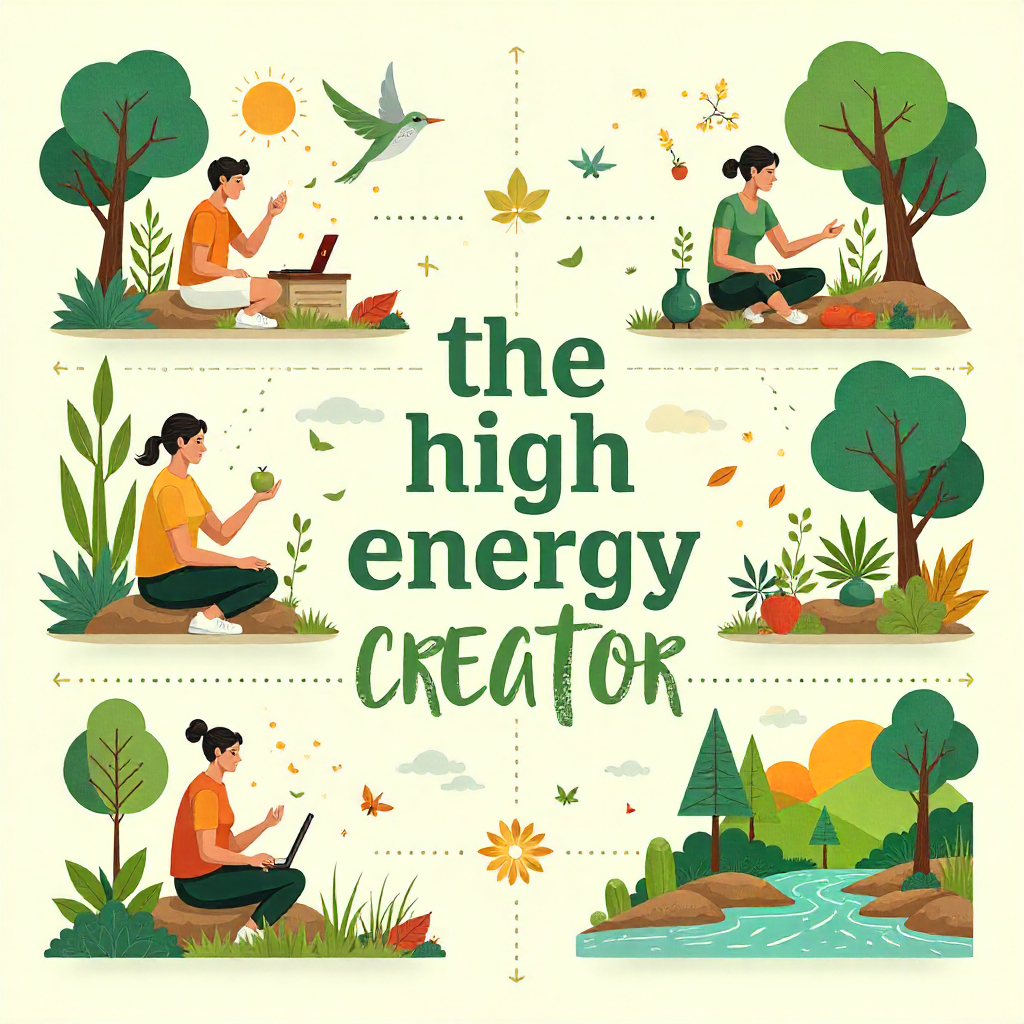
1 thought on “The High-Energy Creator: Daily Routine for Peak Cognitive Performance (Backed by Science)”